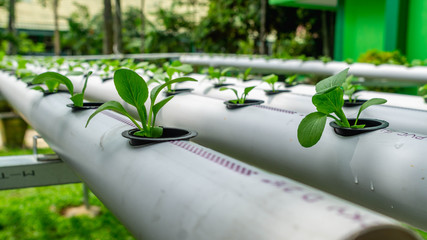Hydroponic systems offer several advantages for urban agriculture, which makes them an increasingly popular choice. Here are some key advantages of using hydroponic systems in urban agriculture:
- Water Conservation: Hydroponic systems use significantly less water compared to traditional soil-based farming. The water in hydroponics is recirculated and reused, reducing water consumption by up to 90% compared to conventional agriculture. This is particularly important in urban areas where water resources may be limited or expensive.
- Space Efficiency: Urban areas often have limited space for agriculture. Hydroponics allows for vertical farming, where plants are stacked vertically, maximizing the use of available space. By growing plants in a controlled environment and eliminating the need for soil, hydroponics allows for higher plant densities and increased productivity per square foot of land.
- Year-Round Production: Hydroponic systems provide the flexibility to grow crops throughout the year, regardless of seasonal limitations. By creating an optimal environment for plant growth, including temperature, light, and nutrient control, hydroponics enables continuous production and reduces dependence on specific growing seasons. This ensures a consistent and reliable food supply in urban areas.
- Improved Crop Quality and Yield: Hydroponic systems provide precise control over nutrient delivery, pH levels, and environmental conditions. This results in faster growth rates, healthier plants, and higher yields compared to traditional farming methods. Additionally, hydroponics minimizes the risk of pests, diseases, and weeds, leading to cleaner and more reliable crop production.
- Reduced Environmental Impact: Hydroponics has a smaller environmental footprint compared to conventional agriculture. By eliminating the need for pesticides, herbicides, and fertilizers in large quantities, hydroponics reduces the potential for water and soil pollution. Moreover, the controlled environment of hydroponics reduces the risk of nutrient runoff and minimizes the use of arable land.
- Enhanced Resource Management: Hydroponic systems allow for precise nutrient delivery to plants, ensuring that they receive the necessary elements in optimal quantities. This efficient resource management minimizes waste and nutrient loss, making hydroponics more sustainable and cost-effective in the long run.
- Local Food Production: Urban agriculture aims to bring food production closer to urban centers, reducing the distance food travels from farm to plate. Hydroponic systems can be set up in unused or underutilized urban spaces such as rooftops, basements, or abandoned buildings. This localization of food production decreases transportation costs, energy consumption, and carbon emissions associated with long-distance food distribution.
In summary, hydroponic systems offer numerous advantages for urban agriculture, including water conservation, space efficiency, year-round production, improved crop quality and yield, reduced environmental impact, enhanced resource management, and support for local food production. These benefits make hydroponics an attractive and sustainable option for growing food in urban areas.
Join 'Farmers Mag' WhatsApp Channel
Get the latest Farming news and tips delivered straight to your WhatsApp
CLICK HERE TO JOIN






